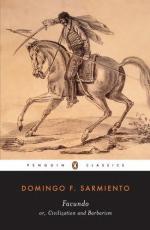|
This section contains 7,998 words (approx. 27 pages at 300 words per page) |

|
SOURCE: Kaplan, Marina. “The Latin American Romance in Sarmiento, Borges, Ribeyro, Cortázar, and Rulfo.” In Sarmiento, Author of a Nation, pp. 314-26. Berkeley: University of California Press, 1994.
In the following excerpt, Kaplan looks at Facundo as a romance, commenting also on the stylistic elements of the novel and magic realism in the text.
[Y] así la humanidad va amontonando leyes, principios, monumentos inmensos, sobre estas oscuras bases cuyos orígenes, cuyas cavidades están ocupadas por un error, por un misterio, por un crimen.
—Joaquín V. González, La tradición nacional (1888)
Domingo Faustino Sarmiento's essay, Facundo, Civilización y barbarie (1845), analyzes the causes of civil strife in Argentina during the period following the country's independence from Spain. Sarmiento's thesis is that the Argentine struggle, usually couched in conventional political terms (such as “federalism” and “unitarianism”), was in reality a fight between two ways of life...
|
This section contains 7,998 words (approx. 27 pages at 300 words per page) |

|


